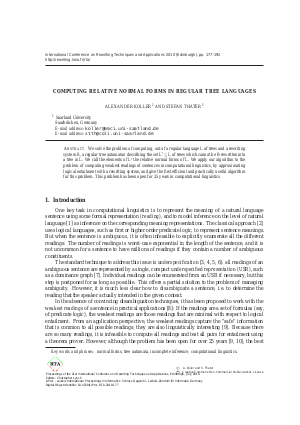Underspecified computation of normal forms
Authors Alexander Koller, Stefan Thater
-
Part of:
Volume:
Proceedings of the 21st International Conference on Rewriting Techniques and Applications (RTA 2010)
Part of: Series: Leibniz International Proceedings in Informatics (LIPIcs)
Part of: Conference: International Conference on Rewriting Techniques and Applications (RTA) - License:
 Creative Commons Attribution-NonCommercial-NoDerivs 3.0 Unported license
Creative Commons Attribution-NonCommercial-NoDerivs 3.0 Unported license
- Publication Date: 2010-07-06
File

PDF
LIPIcs.RTA.2010.177.pdf
- Filesize: 190 kB
- 16 pages
Document Identifiers
Subject Classification
Keywords
- Rewrite systems tree automata normal forms computational linguistics
Metrics
- Access Statistics
-
Total Accesses (updated on a weekly basis)
0PDF Downloads0Metadata Views
Abstract
We show how to compute readings of ambiguous natural language sentences that are minimal in some way. Formally, we consider the problem of computing, out of a set C of trees and a rewrite system R, those trees in C that cannot be rewritten into a tree in C. We solve the problem for sets of trees that are described by semantic representations typically used in computational linguistics, and a certain class of rewrite systems that we use to approximate entailment, and show how to compute the irreducible trees efficiently by intersecting tree automata. Our algorithm solves the problem of computing weakest readings that has been open for 25 years in computational linguistics.
Cite As Get BibTex
Alexander Koller and Stefan Thater. Underspecified computation of normal forms. In Proceedings of the 21st International Conference on Rewriting Techniques and Applications. Leibniz International Proceedings in Informatics (LIPIcs), Volume 6, pp. 177-192, Schloss Dagstuhl – Leibniz-Zentrum für Informatik (2010)
https://doi.org/10.4230/LIPIcs.RTA.2010.177
BibTex
@InProceedings{koller_et_al:LIPIcs.RTA.2010.177,
author = {Koller, Alexander and Thater, Stefan},
title = {{Underspecified computation of normal forms}},
booktitle = {Proceedings of the 21st International Conference on Rewriting Techniques and Applications},
pages = {177--192},
series = {Leibniz International Proceedings in Informatics (LIPIcs)},
ISBN = {978-3-939897-18-7},
ISSN = {1868-8969},
year = {2010},
volume = {6},
editor = {Lynch, Christopher},
publisher = {Schloss Dagstuhl -- Leibniz-Zentrum f{\"u}r Informatik},
address = {Dagstuhl, Germany},
URL = {https://drops.dagstuhl.de/entities/document/10.4230/LIPIcs.RTA.2010.177},
URN = {urn:nbn:de:0030-drops-26521},
doi = {10.4230/LIPIcs.RTA.2010.177},
annote = {Keywords: Rewrite systems tree automata normal forms computational linguistics}
}
